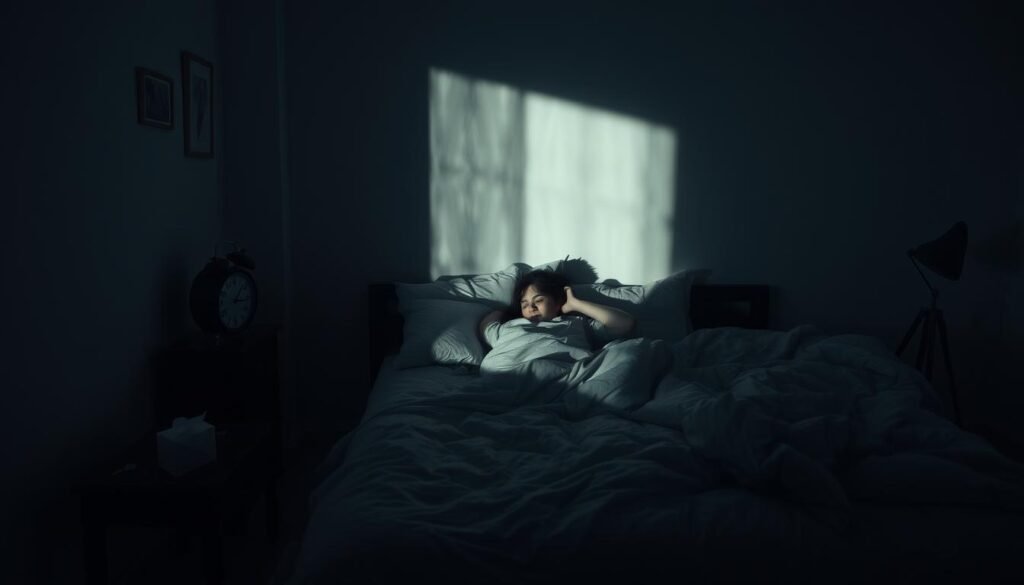About 10% to 15% of people going through deep grief face chronic insomnia. This troubling cycle can make emotional distress even worse. Our sleep support guide looks into how grief affects sleep. It talks about how sadness messes with being able to sleep well. Plus, the guide discusses what happens to our bodies because of it.
Studies show people who can’t sleep well after losing someone struggle more with their grief. Up to 91% of people with complicated grief have trouble sleeping. Knowing this link is key. This guide helps by giving coping mechanisms. These can help people sleep better and feel more emotionally stable.
This guide dives deep into grief and insomnia. It helps readers support themselves or others on this tough journey.
Key Takeaways
- 10% to 15% of grieving individuals experience chronic insomnia.
- Sleep disturbances can significantly hinder coping mechanisms during bereavement.
- 91% of those with complicated grief report having sleep issues.
- The emotional toll of grief often correlates with diminished sleep quality.
- Understanding the interplay between grief and sleep can inform better support strategies.
Introduction to Grief and Its Impact on Sleep
Grief is a deep emotional reaction to losing someone or something. It changes how people handle daily activities. Feeling grief can bring on a mix of emotions, like sadness and worry. These feelings often lead to problems with sleeping.
Studies show a big grief impact on sleep. Many people find their sleep is worse, affecting their whole life. In fact, research says that most Americans struggle with sleep at least once a week. For those grieving, sleep problems are usually more intense.
There are several symptoms of sleep problems. Some have trouble falling or staying asleep. Others wake up too early. It’s important to try and keep a regular sleep schedule to improve sleep during grief. Short naps, no longer than 20 minutes, can help too. But they should be early in the afternoon.
Doing light exercises, like walking or yoga, can also help improve sleep. Losing sleep can make the pain of grief stronger. This can make you feel even more tired and upset. Knowing how grief and bad sleep are linked is the first step to feeling better. For more on mental health and sleep problems, check out this article.
Dealing with sleep issues when you’re grieving is a key part of healing. By understanding what’s causing your sleep troubles, you can work on getting better sleep. This helps with your emotional well-being too.
What is Grief?
Grief is a deep emotional response to loss. It comes from losing someone important, ending significant relationships, or major life changes. This emotional journey can show up in many ways, making the grieving process complex.
People experiencing grief go through a range of feelings. They might feel sad, angry, confused, or numb. Studies show there are different stages in grief: shock, denial, and finally, acceptance. These stages can come and go, creating an intense mix of emotions.
Each year, more than 800,000 older Americans lose their spouses. This loss brings big emotional challenges. Many people see their intense feelings subside within six months. Yet, about 7-10% suffer from complicated grief. This kind of grief is intense and may need help from professionals.
Physical issues also pair with grief. Research finds that widows often struggle with sleep. They have a hard time staying asleep. This shows why understanding grief matters. It helps us see how it affects our sleep and overall health.
| Grief Statistics | Impact on Sleep |
|---|---|
| 800,000 older Americans widowed annually | Increased difficulty maintaining sleep |
| 7-10% of bereaved individuals experience complicated grief | Higher usage of sleep aids among widows |
| Emotional stages peak and dissipate within 6 months | Correlation between sleep disturbances and mental health challenges |
Grief shows in how we deal with losing someone dear. Knowing more about it lets us understand its big impact on sleep and health.
The Connection Between Insomnia and Grief
Grief hits sleep hard, leading to insomnia for many. This connection is key for anyone dealing with loss. Grief shakes up normal sleep, causing troubling disturbances.
How Grief Triggers Sleep Disturbance
Loss brings sleep troubles. Thinking about the lost one can keep you awake. Grief not only hurts emotionally but can stress you out too.
Those who’ve lost a spouse might face more inflammation due to bad sleep. This raises their health risks. The pandemic has made it harder, isolating many when they need support most.
Long-term Effects of Sleep Deprivation in Grieving Individuals
Not sleeping well while grieving can make emotional pain worse. It can make coping harder. Around 7-20% of grieving people might get complicated or prolonged grief.
Bad sleep can hurt your heart and weaken your body’s defenses. Good sleep habits are crucial. The National Sleep Foundation suggests avoiding caffeine and alcohol after 3 p.m. for better sleep.
| Sleep Disturbance Effects | Long-term Consequences |
|---|---|
| Difficulty falling asleep | Chronic fatigue |
| Frequent awakenings | Increased risk of depression |
| Daytime sleepiness | Cardiovascular disease risk |
| Unrestful sleep | Weakened immune response |
Understanding Sleep Disturbances During Bereavement
People who are grieving often find their sleep patterns change dramatically. They can face several sleep issues that make it hard to rest. Knowing what symptoms of insomnia to look for during this tough time is crucial.
Common Symptoms of Insomnia During Grief
Those mourning may struggle with symptoms like:
- Difficulty falling asleep: It’s common to lie awake, thoughts racing, for hours.
- Frequent awakenings: Waking up often during the night, it’s hard to find peace again.
- Unsettling dreams: Disturbing dreams can disrupt sleep further.
Types of Sleep Issues Faced by the Bereaved
Grief can lead to various sleep disturbances that affect rest. Here are some examples:
| Type of Sleep Disturbance | Description |
|---|---|
| Middle Insomnia | It’s hard to sleep again after waking up at night. |
| Early Awakening Insomnia | Waking up too early and not being able to sleep more. |
| Late Onset Insomnia | Having trouble falling asleep until very late. |
| Sleep Fragmentation | Sleep is interrupted, leading to feeling unrested. |

Understanding and addressing insomnia is key to improving sleep for those grieving. Knowing the types of sleep disturbances helps in finding support and adopting healthier sleep habits.
Why Grief Impacts Sleep
Grief impacts sleep deeply. Emotional reactions to loss disrupt sleep patterns significantly. Grief sparks thinking patterns like rumination and stress, making sleep hard.
Mental and Emotional Responses to Loss
Bereavement brings intense emotional struggle, causing profound mental effects. Anxiety and emotional sensitivity increase, complicating sleep. Difficulty in sleeping is common after losing someone. 40% of fathers and 33% of mothers who lost a child to cancer report long-term sleep issues. Sleep trouble can make existing emotional problems worse.
Physical Consequences of Grief-Related Insomnia
Grief-induced insomnia affects the body too. It can lead to higher cortisol levels, causing serious health problems. Heart issues, diabetes, and depression are among these problems. Insomnia makes the brain more alert, disturbing sleep further. Many, 91% in some studies, experience sleep problems during grief. Good sleep habits and relaxation techniques are vital for overcoming these obstacles.
Complicated Grief and Sleep Disorders
Complicated grief is a deep sadness that goes beyond normal mourning. It’s tough for people to move on after losing someone close. Often, this sadness lasts more than a year. This can disrupt someone’s sleep, causing different sleep problems.
Defining Complicated Grief
Complicated grief happens for many reasons, like sudden or violent deaths. It’s more common in women and the elderly. Factors like being alone a lot, past mental health issues, and big life changes can make grief worse. Because of the stress, about 80% of those suffering have trouble sleeping.
Symptoms of Complicated Grief and Sleep Issues
People with complicated grief show several signs that affect their life. These include:
- Intense emotional pain
- Preoccupation with the deceased
- Feelings of emptiness
- Difficulty finding pleasure in daily activities
Along with deep sadness, they often have sleep problems. This can lead to anxiety, depression, and even physical sickness like heart disease. Getting help early through counseling can help them heal.
Healthy Coping Mechanisms for Insomnia and Grief
Grief deeply affects people, causing insomnia and reducing emotional health. Using good coping methods for grief can improve these issues and overall happiness. A fixed daily routine gives stability during hard times. Sleeping at the same times helps set your body’s clock, making sleep problems easier to handle.
Regular physical activity is key for better sleep. Things like walking can lift your mood and lower stress. People active before experiencing loss find it easier to deal with their feelings. Exercising helps with physical health and also brings social support, which is precious during grief.
- Practice relaxation techniques such as meditation and yoga to calm the mind.
- Incorporate a balanced diet rich in fruits and vegetables, and eat with loved ones to promote emotional wellness.
- Limit unhealthy eating behaviors by focusing on smaller meals throughout the day.
Taking these actions can help those dealing with loss feel more normal again. For deeper help, they can check out detailed self-help resources. Adding these coping strategies can give people the tools to manage grief. It also improves their sleep and emotional health.
Sleep Hygiene Tips for Better Rest During Grieving
Grief can make it hard to sleep well. Effective sleep habits are key for those grieving. These habits can help create a calm space that’s good for sleep. Trying a few basic tips can really help someone get better rest while dealing with sadness.
Establishing a Consistent Sleep Schedule
Keeping the same sleep schedule is an important first step. Going to bed and waking up at the same times every day helps set your body’s clock. This can make falling asleep easier and improve sleep quality. This is especially helpful when you’re dealing with grief.
Creating a Sleep Sanctuary
Turning your bedroom into a sleep sanctuary is crucial. Noise, light, and comfort all affect how well you sleep. Comfy bedding, a dark room, and few distractions help you relax. This is very important when you’re sad. Meditation is another way to make your sleep space more peaceful.
Limiting Caffeine and Alcohol Intake
Limits on caffeine and alcohol are key, as they can hurt your sleep. Caffeine can keep your mind buzzing. Alcohol might seem to help at first but leads to waking up often at night. Staying away from these can support better sleep when times are tough. For tips on good sleep habits while grieving, visit this helpful guide to improving sleep hygiene.

When to Seek Help for Grief-Related Sleep Disturbances
Knowing when to get help is key for those with grief-caused sleep trouble. Spotting signs for the need of expert aid can greatly aid in recovery. Persistent sleeplessness, especially if it hampers day-to-day life and happiness, is a major sign.
Feeling swamped by sorrow with ongoing sleep problems may show a need for help.
Recognizing Signs for Professional Support
People might see various signs that point to needing professional help. It’s important to watch out for:
- Persistent sleep disruptions, like trouble falling or staying asleep, that last more than a month.
- Prolonged feelings of sadness or guilt past six months, which might mean prolonged grief disorder.
- Inability to perform daily tasks, impacting personal, social, or work life.
- Increased feelings of anxiety or stress, making it hard to handle grief.
Available Treatment Options for Sleep Issues
There are several treatments for those with sleep issues from grief. These include:
- Cognitive Behavioral Therapy (CBT), a therapy the NHS provides for free to tackle sleep problems and emotional reactions to grief.
- Medication for insomnia, given by doctors when needed, to help create a regular sleep cycle.
- Grief counseling, which is talking to a professional about dealing with grief along with sleep problems.
- Doing regular physical activity, keeping a steady sleep routine, and using relaxation techniques to lessen symptoms.
Supporting Yourself Through Grief and Insomnia
Navigating grief and insomnia means taking care of yourself. It’s important to stay active with walking, swimming, or gardening. These activities boost your mood and help you sleep better.

Keeping up healthy habits is crucial when dealing with grief. To manage insomnia, here are some tips:
- Exercise more during the day to improve sleep quality.
- Avoid caffeine and limit sugar intake after 4 p.m. for better sleep.
- Restrict naps to keep night sleep steady.
- Stay away from screens after 8 p.m. to sleep better.
- Writing down your next day’s tasks an hour before bed can calm worries.
Sticking to a sleep schedule is vital. Try to go to bed and wake up at the same time every day, even on weekends. Don’t exercise or eat big meals right before bed.
On the other hand, a small, rich snack like peanut butter crackers or a boiled egg can help you sleep.
Deep breathing can really help with stress, anxiety, and sadness. You can do these exercises almost anywhere. They make a big difference in how you feel.
Talking to friends or joining a group can make you feel better. Writing or making art helps you work through your feelings. Regularly practicing either mindfulness or mantra meditation can also be calming.
Being kind to yourself is essential when you are grieving. Creating a caring space around you helps manage insomnia and grief. Taking care of yourself isn’t just about feeling better. It also makes you stronger against the challenges of loss.
| Self-Care Activity | Benefits for Emotional Health |
|---|---|
| Gentle exercise | Releases tension, boosts mood |
| Deep breathing | Reduces anxiety, calms the mind |
| Creative expression | Enhances emotional processing |
| Social connection | Strengthens support networks |
| Mindfulness meditation | Improves mental clarity, decreases stress |
Resources for Grief Counseling and Support Groups
Grief affects us all at some point. Finding grief counseling resources is key for moving forward. People dealing with loss face many hard feelings and challenges. So, having access to the right support is very important. Places like Northeast Georgia Medical Center offer free help through counseling and groups.
Support groups give a warm place for people to come together. They share stories and get emotional support. These groups are run by peers or professionals. They provide a safe space to talk and feel supported. Many groups out there focus on specific issues. This can include dealing with death, chronic sickness, or mental health problems.
| Organization | Type of Support |
|---|---|
| Pine Rest | Counseling and therapy services |
| Hoag Family Cancer Institute | Cancer support groups |
| The Mary & Dick Allen Diabetes Center | Virtual support groups for diabetes |
| Hoag Memorial Hospital Presbyterian | Bereavement support groups |
| Pickup Family Neurosciences Institute | Insomnia Support Group |
| American Sleep Apnea Association | Health awareness group for sleep |
These resources are really important. They help lessen the loneliness that comes with grief. Online options make it easier for everyone to join in. Sometimes, you may need to seek more help. When the pain of grief doesn’t leave, finding support groups quickly is essential for your well-being.
Conclusion
Grief and insomnia are closely linked, affecting how we sleep during tough times. Knowing that grief comes from many sources is key. It could be the loss of someone we love or big life changes. These events can lead to sleep problems, impacting our mental health and well-being.
For those dealing with grief, it’s important to look after yourself. Create a routine, get support from friends or experts, and keep active. Realizing that grief touches both heart and mind helps us find ways to heal and sleep better.
If grief and sleep issues last a long time, remember you’re not alone. Seeking help is crucial for healing and getting better sleep. By being aware and taking action, anyone can start to feel better and healthier.